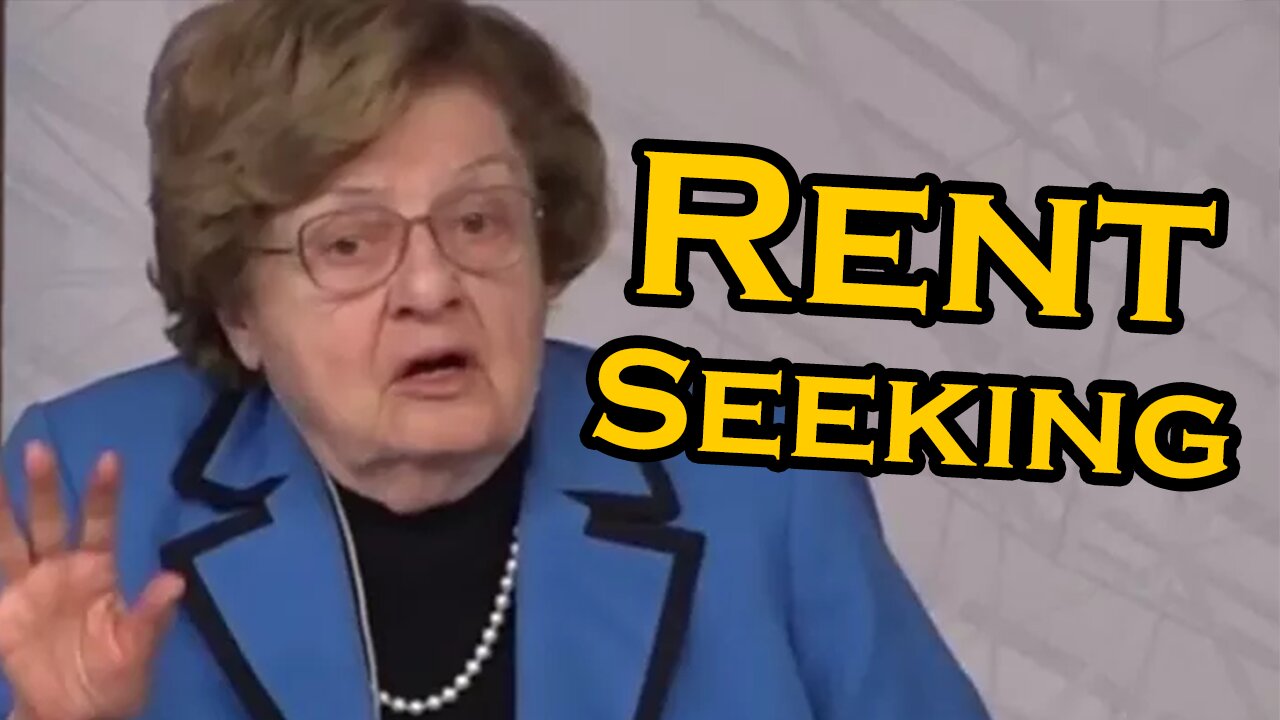Premium Only Content

What is Rent-Seeking? Meaning, Definition, and Explanation
From Wikipedia: https://en.wikipedia.org/wiki/Rent-seeking
Rent-seeking is the effort to increase one's share of existing wealth without creating new wealth. Rent-seeking results in reduced economic efficiency through misallocation of resources, reduced wealth-creation, lost government revenue, heightened income inequality, and potential national decline.
Attempts at capture of regulatory agencies to gain a coercive monopoly can result in advantages for rent-seekers in a market while imposing disadvantages on their uncorrupt competitors. This is one of many possible forms of rent-seeking behavior.
Part 1. Description.
The term rent-seeking was coined by the British 19th-century economist David Ricardo, but only became the subject of durable interest among economists and political scientists more than a century later after the publication of two influential papers on the topic by Gordon Tullock in 1967, and Anne Krueger in 1976. The word "rent" does not refer specifically to payment on a lease but rather to Adam Smith's division of incomes into profit, wage, and rent. The origin of the term refers to gaining control of land or other natural resources.
Georgist economic theory describes rent-seeking in terms of land rent, where the value of land largely comes from government infrastructure and services (e.g. roads, public schools, maintenance of peace and order, etc.) and the community in general, rather than from the actions of any given landowner, in their role as mere titleholder. This role must be separated from the role of a property developer, which need not be the same person.
Rent-seeking is an attempt to obtain economic rent (i.e., the portion of income paid to a factor of production in excess of what is needed to keep it employed in its current use) by manipulating the social or political environment in which economic activities occur, rather than by creating new wealth. Rent-seeking implies extraction of uncompensated value from others without making any contribution to productivity.
In many market-driven economies, much of the competition for rents is legal, regardless of harm it may do to an economy . However, various rent-seeking behaviors are illegal, mostly through bribery of local and federal politicians, or corruption.
Rent-seeking is distinguished in theory from profit-seeking, in which entities seek to extract value by engaging in mutually beneficial transactions. Profit-seeking in this sense is the creation of wealth, while rent-seeking is "profiteering" by using social institutions, such as the power of the state, to redistribute wealth among different groups without creating new wealth. In a practical context, income obtained through rent-seeking may contribute to profits in the standard, accounting sense of the word.
Part 1.1. Tullock paradox.
The Tullock paradox is the apparent paradox, described by economist Gordon Tullock, on the low costs of rent-seeking relative to the gains from rent-seeking.
The paradox is that rent-seekers wanting political favors can bribe politicians at a cost much lower than the value of the favor to the rent-seeker. For instance, a rent seeker who hopes to gain a billion dollars from a particular political policy may need to bribe politicians with merely ten million dollars, which is about 1% of the gain to the rent-seeker. Luigi Zingales frames it by asking, "Why is there so little money in politics?" because a naïve model of political bribery and/or campaign spending should result in beneficiaries of government subsidies being willing to spend an amount up to the value of the subsidies themselves, when in fact only a small fraction of that is spent.
Possible explanations:
Several possible explanations have been offered for the Tullock paradox:
Voters may punish politicians who take large bribes, or live lavish lifestyles. This makes it hard for politicians to demand large bribes from rent-seekers.
Competition between different politicians eager to offer favors to rent-seekers may bid down the cost of rent-seeking.
Lack of trust between the rent-seekers and the politicians, due to the inherently underhanded nature of the deal and the unavailability of both legal recourse and reputational incentives to enforce compliance, pushes down the price that politicians can demand for favors.
Rent-seekers can use a small part of the benefit gained to make contributions to the politicians who provided enabling legislation.
Part 1.2. Examples.
The classic example of rent-seeking, according to Robert Shiller, is that of a property owner who installs a chain across a river that flows through his land and then hires a collector to charge passing boats a fee to lower the chain. There is nothing productive about the chain or the collector. The owner has made no improvements to the river and is not adding value in any way, directly or indirectly, except for himself.
[Continue on Wikipedia]
-
 21:24
21:24
marcushouse
11 hours ago $0.08 earnedStarship Flight 10: Go or No? 🚀
21.8K12 -
 LIVE
LIVE
MrR4ger
16 hours agoSUNDAY FUNDAY w/ R4GER - VARIETY / DIABLO 4/ FOR HONOR / ETC?
84 watching -
 5:40
5:40
WhaddoYouMeme
3 days ago $0.22 earnedThey’re Calling This the End of Masculinity
26.8K25 -
 15:24
15:24
Tactical Advisor
20 hours agoBest 2011 of 2025 | Bul Armory Ultralight Pro
28.2K1 -
 27:31
27:31
True Crime | Unsolved Cases | Mysterious Stories
2 days ago $0.14 earnedThe Hong Kong Schoolgirl Mystery – 5 Mysterious Unsolved Cases (Part 8)
21K3 -
 7:19
7:19
China Uncensored
1 day agoChina is DONE in the South China Sea
17.1K41 -
 5:17:07
5:17:07
Joe Donuts Live
6 hours ago🟢 Loot Rats Unleashed: Arena Breakout Chaos! | Joe + Tony + Vlad
27.5K1 -
 30:37
30:37
Degenerate Plays
18 hours ago $0.01 earnedThis College Is Out Of Control - GTA Online : Part 9
10.2K -
 16:28
16:28
Mrgunsngear
3 days ago $0.50 earnedBeretta 92XI SAO Sabbia Review - A Few Surprises
11.5K6 -
 1:48
1:48
Memology 101
2 days ago $0.08 earnedThis aged like milk for Tish James...
6.33K7